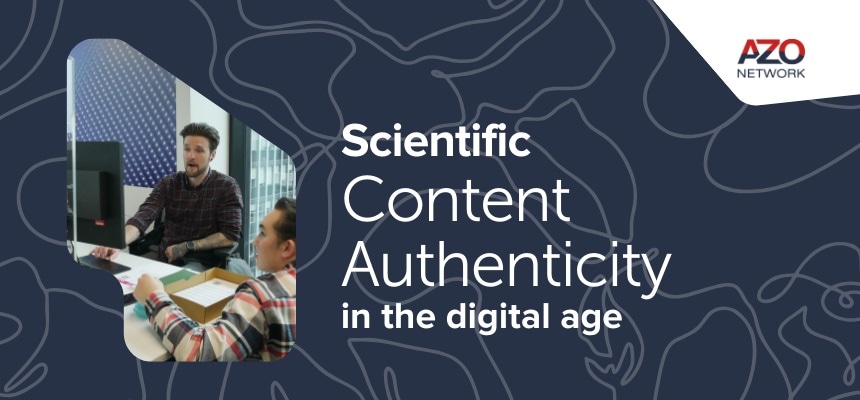
Digital information is everywhere. This makes distinguishing authentic and trustworthy content more problematic for everyone, especially in science. As the evolution of AI continues into 2024, the quest for authenticity within STEM sectors not only shapes public trust but also dictates the integrity of scientific companies.
This article explores the evolving landscape of content authenticity and its role in fostering a trustworthy relationship between scientific communities and their audiences.
What Makes Content Authentic?
Authentic digital content is rooted in SEO. A good Google guideline for content quality and authenticity is “E-E-A-T”:
Experience means how much real-life or direct experience someone has with the topic they're talking about. For example, a doctor may talk about the benefits their patients have seen from using a specific drug treatment.
Expertise is about how much knowledge or skill someone has in a specific area. For example, qualifications within the content creator’s field, such as a Ph.D.
Authority or authoritativeness is whether the person or website is widely recognized as a reliable source on a topic. Not all topics have one "official" source, but when they do, these sources are usually very trustworthy. For example, the World Health Organization is an authoritative source of information on global health.
Trust means how much you can rely on a webpage to be accurate, honest, safe, and reliable. Different types of pages need different levels of trust. For example:
- Online stores should have secure payment systems and good customer service.
- Product reviews must be honest and aim to help people make smart buying choices, not just sell something.
- Pages on “Your Money or Your Life” (health, finance, safety) topics that provide information must be accurate to avoid harming people or society.
Google clarifies that trust is the most important of the four. Considering the purpose, type, and topic of the content should help you decide what would make the creator a trustworthy source in that context.
Building Your Authority and Trust
Authentic content attracts and retains a dedicated audience. Authenticity fosters a sense of loyalty among readers, encouraging them to engage with and advocate for the brand they are engaging with.
One way to achieve this is with thought-leadership-focused content. Sharing interviews with your industry experts about industry problems and challenges and how your product can solve them shows E-E-A and Builds the T.
Essential Training and Resources
Equipping your content creators with the right tools and knowledge is crucial. Our senior content writer, Ben Stibbs-Eaton, has outlined essential training and resources that can aid in producing authentic and trustworthy scientific content below.
Formal Education
- Bachelor’s Degree: Focus on transferable skills rather than specific scientific knowledge. A BsC can provide relevant scientific know-how but can pigeonhole your expertise to a given field. A bachelor's degree in science, technology, engineering, mathematics (STEM), or related fields can be beneficial. But IMHO, a BA in humanities (English lit, creative writing, marketing, etc.) is better. It’s harder to teach a scientist to write compelling copy than to make an experienced writer sound like a scientist.
- Advanced Degrees (Master’s or Ph.D.): Advanced degrees can be crucial for more in-depth research skills, especially for topics requiring specialized knowledge.
Continuous Learning and Professional Development
- Online Courses and Certifications: Platforms like Coursera and LinkedIn Learning offer courses on scientific writing, research methodologies, and specific scientific subjects. Learning about science communication is highly beneficial.
- Workshops and Seminars: Participating in industry-specific workshops and seminars, often covering the latest research, emerging technologies, and current issues in various scientific fields. This is where specific scientific knowledge can be cultivated to complement excellent writing skills. It’s harder to do it the other way around.
- Professional Associations: Membership in organizations like the National Association of Science Writers (NASW) provides access to resources, networking opportunities, and continuing education.
Writing and Editing Skills
- Scientific Writing Courses: Training in scientific writing to master the art of presenting complex information clearly and concisely.
- Editorial Software: Mastery of editorial software (e.g., LaTeX, EndNote, Grammarly) for professional formatting, citation management, and grammar checking.
Research and Fact-Checking Resources
- Scientific Journals and Databases: Access to peer-reviewed journals (e.g., Nature, Science, PubMed) and databases (e.g., Web of Science, Scopus) is essential for sourcing the latest research findings and data.
- Institutional Resources: Collaborations with companies and research institutions can provide access to specialized knowledge, experts for interviews, and proprietary research materials.
- Fact-Checking Organizations: Utilizing fact-checking resources (e.g., FactCheck.org, Snopes) and scientific checklists to verify the accuracy of information before publication.